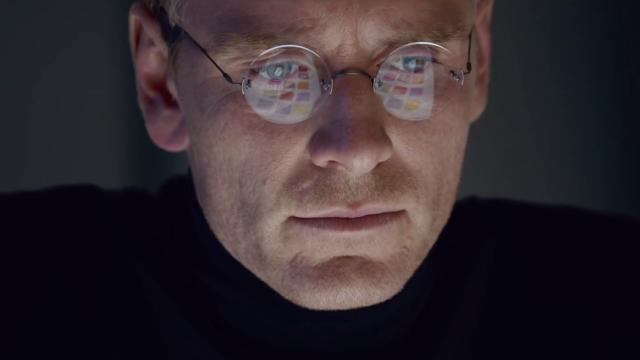Five minutes into Steve Jobs, I didn’t think I was gonna make it.
I am, indeed, a product of the attention-deficit generation whose mind was ruined by the “beautiful” ideas of Steve Jobs. I’ve heard the stories about Jobs’ meticulous obsession with details, and his mercurial, uncompromising personality. How could I not be? They have been etched on our public consciousness with an endless stream of books, movies, TV specials, magazine articles. Steve Jobs jumps right into establishing these genius and arsehole personalities right from the start: It’s 1984, and there’s Steve Jobs fretting about the fine points of the Macintosh unveiling event. He’s being meticulous and an arsehole. “Ugh, Shit,” I thought. “Not this again. I can’t sit through this again.”
Hella spoilers ahead — but you know what happens at the end, right?
Then five minutes later, I was saddled in my seat barely blinking, my brain chewing every word of Aaron Sorkin’s delicious script. You’ve seen a Sorkin movie before? Characters chat in dense, witty paragraphs. No one in reality talks like this, but listening to the dramatic portrayals of Steve Jobs and Joanna Hoffman (deftly played by Michael Fassbender and Kate Winslet) when they’re written like conflicted heroes in a Shakespeare play is great fun. This is Sorkin, for sure. You’re able to dissociate the story you’re watching from the story you’ve heard a million times. This isn’t a trite tech biopic. It’s just great cinema.
Sorkin’s story benefits from its structure. It’s a three-act play, really. There are three long scenes, each set in the 30 or so minutes before three major product launches: the 1984 launch of the Macintosh, the 1988 launch of the Nextcube, and finally the 1998 launch of the iMac. Each of the scenes takes place in real time, such that a minute of screen time is a minute in the world of the film. Danny Boyle renders the the script to life with wonderful direction.
In each section, Jobs navigates backstage areas like a general parading around a military encampment, arguing with key figures in his life: His former lover Chrisann Brennan, his daughter with Brennan, Lisa, his best friend Steve Wozniak, his confidant and Apple marketing executive Joanna Hoffman, former software engineer Andy Hertzfeld, and former Apple CEO John Sculley.
And argue with them he does! This guy liked to argue, we’re meant to understand. It’s a good thing too, because not a whole hell of a lot is happening in this movie. It’s just people talking, so it might have been really boring if everyone was getting along with each other.
Jobs doesn’t come off real well. He’s unconscionably rude and difficult with everyone around him. He treats everyone like shit. Sure, he’s the boss, and he’s stressed out before a product launch. But his daughter? At first he refuses to even acknowledge that she’s his daughter. He grows into it, and the film ends on a gauzy note between the two. Just before Jobs takes the stage to announce the iMac — the first Jobs product to really change things — he shares a tender moment of light mutual understanding with his then-19-year old daughter. Aw, cute.
The movie isn’t naive about who Jobs was. When Alex Gibney’s critical documentary about Jobs was released last month, I noted that it’s important to acknowledge what a shitfuck Jobs was to everyone around him. For its part, Steve Jobs doesn’t shy away off highlighting Jobs’ difficult personality. It does try to explain it away a little bit with a portrayal that says that he was damaged by a sense of rejection from having been put up for adoption by his parents.
Movies don’t need to have morals, and this isn’t a documentary. Theoretically, anyway. But a question I’ve been pondering with all of the Jobs media that’s been released in the years since his death is whether or not we absolve Jobs for his assholishness, just because he was a genius who had a huge positive impact on the world. Is it OK? Do we let him off the hook for the fuck ups, and the people he laid off because his hubris led him down the wrong path? Do we forgive the immorality of his throwing executives under the bus to get himself off the hook for securities fraud? Is it all right that he denied his own daughter, because they made up 20 years later?
The Sorkin-Boyle portrait is certainly nostalgic about the man. It’s hard not to be. He was electric. He’s an icon. For all the jerkiness portrayed in the film, of course they let him go.
People on both sides of the “he was a jerk”/”he was a hero” divide have complained that the movie doesn’t represent fact. Sorkin has been upfront that portions of the movie are complete inventions. For example, John Sculley and Jobs never spoke again after Jobs was fired from Apple following the Macintosh disaster, and yet, the ex-CEO appears at two keynotes in the film he didn’t actually attend.
Luckily, I don’t think we’re expected to view Steve Jobs as an expression of fact about the man. Think of it as a gripping, witty drama. That way, it’s not really all that important whether or not they give a happy spin to a the transgressions of a sociopath. It’s just a fun movie to watch! If you want to get bogged down by the meaning and legacy of the Jobs myth vs the reality, well, this movie is probably just going to piss you off.
